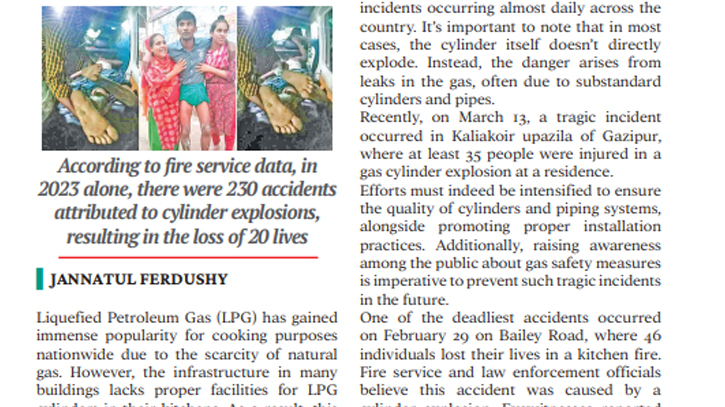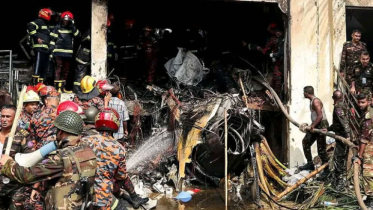
Photo : Messenger
Liquefied Petroleum Gas (LPG) has gained immense popularity for cooking purposes nationwide due to the scarcity of natural gas. However, the infrastructure in many buildings lacks proper facilities for LPG cylinders in their kitchens. As a result, this widely used fuel, also known as cylinder gas, has become increasingly hazardous.
Reports of casualties resulting from cylinder explosions are distressingly common, with incidents occurring almost daily across the country. It's important to note that in most cases, the cylinder itself doesn't directly explode. Instead, the danger arises from leaks in the gas, often due to substandard cylinders and pipes.
Recently, on March 13, a tragic incident occurred in Kaliakoir upazila of Gazipur, where at least 35 people were injured in a gas cylinder explosion at a residence.
Efforts must indeed be intensified to ensure the quality of cylinders and piping systems, alongside promoting proper installation practices. Additionally, raising awareness among the public about gas safety measures is imperative to prevent such tragic incidents in the future.
One of the deadliest accidents occurred on February 29 on Bailey Road, where 46 individuals lost their lives in a kitchen fire. Fire service and law enforcement officials believe this accident was caused by a cylinder explosion. Eyewitnesses reported a small fire initially, which then rapidly escalated with three or four loud noises, indicating the explosion of the cylinder or the gas released from it.
According to fire service data, in 2023 alone, there were 230 accidents attributed to cylinder explosions, resulting in the loss of 20 lives.
On September 4, 2020, 34 people died in such an explosion in a mosque in Narayanganj.
On January 24, five Rohingya children died in a gas fire released from a gas cylinder in Bhasanchar, Hatia, Noakhali. Earlier on December 11, one person died in a gas cylinder explosion in a textile mill in Tongi, Gazipur. Thus, due to lack of awareness and carelessness, accidents caused by LPG gas cylinders are regularly causing casualties.
Experts assert that cylinder accidents stem from technical faults, ignorance, and carelessness, contributing to the alarming rise in such incidents. What was once intended to simplify cooking tasks has tragically transformed into a looming threat to lives.
In response to inquiries regarding the recurring cylinder explosions, a former chief inspector of the Department of Explosives stated that cylinders typically do not explode themselves. Instead, the explosions often originate from other parts of the cylinder or the gas system, highlighting the need for thorough investigations and measures to address vulnerabilities in the entire gas infrastructure.
Professor of Chemical Engineering University of Engineering (BUET) Izaz Hossain told the Daily Messenger “Usually 2 percent of LPG gas and 5 percent of line natural gas are exposed to air, which creates the possibility of explosion. Cylinder gas has 10-12 times less pressure than line gas. As a result, the damage should not be too much if the cylinder explodes. Still, explosions are happening in the country. Analysing the cause of the accident, it will be seen that the cylinder is intact despite the explosion.”
Most of the cylinders are poor in quality. Apart from this, the cylinder is kept very close to the stove. Transport and maintenance of cylinders are not strictly regulated. Not properly closed after use. As a result, gas leakage causes an accident. However, gas is refilled in low quality cylinders illegally by buying cylinders and gas from big companies. These cylinders are not safe.
The former chief inspector further emphasised that the majority of household incidents are attributed to gas leakage, primarily stemming from defects in the cylinder connecting pipe, stove rubber, or regulator. This leakage may accumulate within the confines of a closed house, creating a highly volatile environment. Ultimately, an electric spark or any source of ignition can trigger a catastrophic explosion under these circumstances.
Messenger/Fameema








